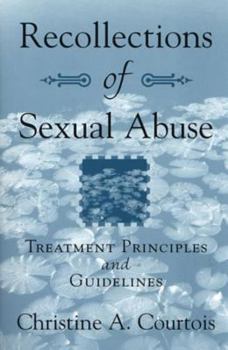Recollections of Sexual Abuse: Treatment Principles and Guidelines
Select Format
Select Condition 
Book Overview
Since the eruption of the recovered memory controversy in 1992, the treatment of adults who report abuse as children (whether their memory has been relatively continuous or has been recovered) has become a high-risk area, as numerous lawsuits have been filed alleging false memory of abuse due to suggestive therapeutic practices. In this climate, clinicians have become fearful, cautious, and confused about how to practice responsibly with this population. Since a large percentage of those seeking psychotherapy have a history of sexual abuse, all clinicians need a clear articulation of the current evolving standard of care for clients reporting memories of abuse. Drawing together material from many sources, this book provides state-of-the-art principles and guidelines for treatment when memories of past abuse are at issue. It covers available empirical and clinical data on human memory processes for normal and traumatic events and on the treatment of posttraumatic conditions in general and child sexual abuse in particular; the critiques and concerns voiced by cognitive psychologists who investigate memory and suggestibility issues; the recommendations made by a number of professional task forces and advisory committees charged with studying the issues involved in the controversy and making recommendations for practice; and the recommendations of expert clinicians and clinical researchers. Especially useful is Courtois's application of the treatment decision model to a range of clinical scenarios, from continuous, corroborated memory of abuse to suspicions of abuse based on symptomatology. Speaking with authority and empathy, Courtois shows clinicians how to practice responsibly and safely while doing memory work. Her guidance is invaluable.
Format:Hardcover
Language:English
ISBN:0393702812
ISBN13:9780393702811
Release Date:January 1999
Publisher:W. W. Norton & Company
Length:464 Pages
Weight:2.02 lbs.
Dimensions:1.6" x 6.5" x 9.6"
Customer Reviews
2 ratings
the essential guide for clinicians
Published by Thriftbooks.com User , 15 years ago
This volume provides evidence-based clinical guidance for therapists working with clients who have been sexually abused. It offers clear, unambiguous guidelines for responsibly managing clients' disclosures of recollections of sexual abuse as well as treatment principles for working with this population. If I could I would give this book 100 stars-- it is truly the best, most authoritative guide to helping and not hurting clients. It offers context and scientific analysis concerning the false memory/recovered memory controversies of the last two decades, the emerging consensus about sexual abuse treatment, and risk management issues in assessment and treatment. This volume is one I strongly encourage every clinician to read and keep handy. Also highly recommended: Healing the Incest Wound: Adult Survivors in Therapy.
a wonderful guide for professionals
Published by Thriftbooks.com User , 18 years ago
It was from Courtois' first book, "Healing the Incest Wound" (1988) that I got my basic training in working with survivors of childhood sexual abuse just after it came out. This later book is a wonderful companion to her earlier work. Courtois continues to develop her professional expertise and incorporate changes in societal awareness and ability to come to terms with the sheer numbers of sexually traumatized individuals in its midst. If you want a clear and thorough guide about how to work with survivors who need to come to terms with memories of abuse, this is the best text to begin with.





